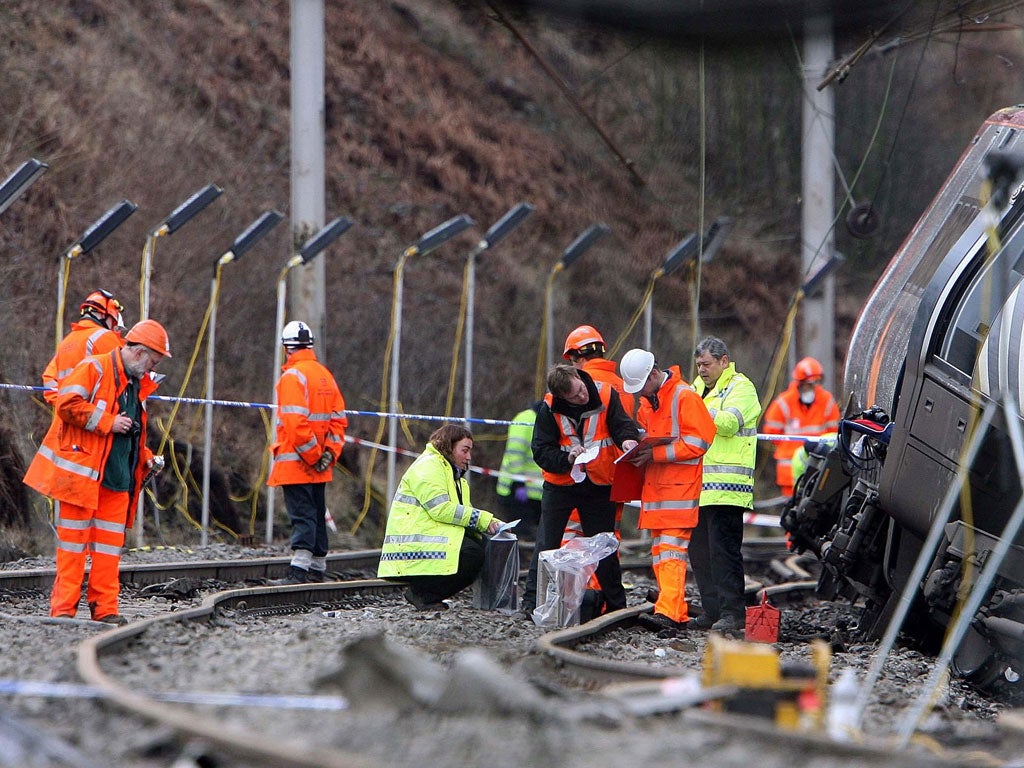Network Rail accused over death

Your support helps us to tell the story
From reproductive rights to climate change to Big Tech, The Independent is on the ground when the story is developing. Whether it's investigating the financials of Elon Musk's pro-Trump PAC or producing our latest documentary, 'The A Word', which shines a light on the American women fighting for reproductive rights, we know how important it is to parse out the facts from the messaging.
At such a critical moment in US history, we need reporters on the ground. Your donation allows us to keep sending journalists to speak to both sides of the story.
The Independent is trusted by Americans across the entire political spectrum. And unlike many other quality news outlets, we choose not to lock Americans out of our reporting and analysis with paywalls. We believe quality journalism should be available to everyone, paid for by those who can afford it.
Your support makes all the difference.Pressure was mounting for a public inquiry into the safety of Britain’s railways last night after an inquest jury ruled that poorly maintained points were to blame for a fatal train crash on the West Coast Main Line.
An 84-year-old woman died and 22 people were injured when a high-speed Virgin Pendolino travelling from London to Glasgow careered off the tracks and plunged down an embankment in winter darkness near the remote village of Grayrigg in Cumbria in 2007.
In what has been described as the most significant breach of railway safety since the disaster at Potters Bar five years earlier, a jury heard that a catalogue of failures by Network Rail (NR) led to the tragedy.
The Office of Rail Regulation (ORR), the industry’s independent regulator, said it was considering whether to bring criminal proceedings for possible health and safety offences in relation to the crash.
The Crown Prosecution Service is also awaiting a report from British Transport Police detailing any fresh new evidence to emerge from the inquest before deciding whether to reopen the case.
Meanwhile Bob Crow, RMT General Secretary, said pressure for faster and more frequent trains had led to unacceptable pressure on staff. “We cannot wait for another derailment and another inquest to deal with these issues and now need an urgent public inquiry,’ he said.
The family of Margaret Masson, 84, who was killed when the 300 tonne tilting train derailed at 95mph with 86 terrified passengers on board, accused Network Rail of negligence.
The two week inquest at Kendal in Cumbria had earlier heard tearful evidence from David Lewis, who was a track section manager for Network Rail at the time and one of three workers arrested over possible manslaughter charges but later released.
Mr Lewis told the jury that he had simply forgotten to check the faulty points a few days earlier while working under intense pressure during the £9bn upgrade amid a backlog of repairs and a shortage of staff and training.
Mrs Masson’s son, George, 62, praised Mr Lewis for trying to warn his bosses in a string of e-mails of the “shambles” over maintenance.
He said: “All this seems to have fallen on one man, Mr Lewis. But he has my utmost respect. He was the only person to show sincerity and he is going to suffer for this for the rest of his life, as we are.”
The inquest heard that paperwork had been fabricated sometimes using correcting fluid and that faults on the line were not always reported up the chain of command at NR. One worker said staff were subjected to "bully boy" management.
Prashant Popat QC, representing NR, said there had been "substantial human and financial investment" in the railways since the crash. A thorough review of points after Grayrigg revealed that a third of the 700 tested nationwide had faults.
South Lakes MP Tim Farron, who is President of the Liberal Democrats, backed the call for an inquiry and said he would be writing to the Prime Minister urging the Government to act. Next week coroner Ian Smith will issue a report raising his concerns for industry safety.
Join our commenting forum
Join thought-provoking conversations, follow other Independent readers and see their replies
Comments